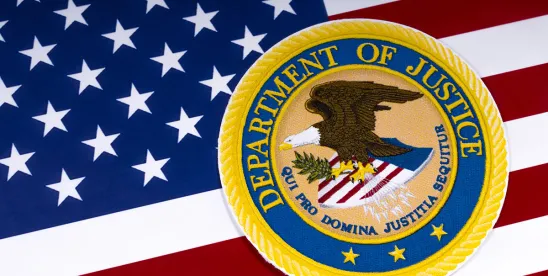- On October 9, the Department of Justice’s (DOJ) Civil Rights Division convened the heads of federal agency civil rights offices to discuss and promote coordination around preventing harms that may stem from AI, including unlawful discrimination.
- The convening highlighted a recent speech by the Civil Rights Division’s new Chief Technologist, who discussed how the agency will keep up with new harms and risks that may arise from advancements in AI.
- The convening also showcased four recent efforts by various agencies to safeguard civil rights in the AI ecosystem and harness AI to promote equity and inclusion.
- The convening concluded with the heads of the various agency civil rights offices promising to continue collaborating to protect Americans from harms that may result from AI.
On October 9, the Justice Department’s Civil Rights Division brought together the leaders of various federal agency civil rights offices to align their efforts in protecting civil rights from potential harms associated with AI. During the convening, the DOJ's new Chief Technologist discussed the importance of keeping pace with advancements in AI and the emerging challenges they bring. The convening also highlighted recent efforts by agencies to promote AI equity and safeguard against potential harms and risks stemming from AI.
Although no specific enforcement actions or policies were unveiled during the convening, its occurrence highlights the agencies’ commitment to prioritizing the protection of civil rights from potential AI-related harms. The convening concluded with the agencies promising to continue to collaborate to protect the American public from harms to civil rights that may arise from AI.
New DOJ Civil Rights Division Chief Technologist
“To strengthen the division’s efforts to ensure equity in AI,” the Civil Rights Division introduced its new Chief Technologist, Dr. Laura Edelson, at the convening. According to the readout, her role focuses on “systematically [expanding] the division’s AI enforcement capacity” and “[increasing] the efficiency of its operations by harnessing technological modernization.”
The convening highlighted Dr. Edelson’s speech at the DOJ’s October 2 Symposium on AI, where she discussed how law enforcement agencies are adapting their enforcement strategies to a future in which “more and more aspects of American life are mediated by AI.” In that speech, the Chief Technologist outlined three main ways that the division will keep up with AI advancements:
- First, describing the public as “one of the most important resources for an enforcement agency,” Dr. Edelson called on the public to submit complaints of discrimination, “even if that discrimination was via an AI or other technological system,” and for AI whistleblowers to come forward. “Given the lack of public transparency around how some AI models function,” she noted that system designers and company insiders “may be in the best position to discover and document illegal discrimination.” “If someone believes that an AI model or another algorithm they have worked on is acting in a way that violates people’s civil rights,” the Chief Technologist remarked, “our investigators want to hear from them.”
- Second, “independent research into AI systems and algorithms has been really vital to our enforcement programs and will continue to grow in importance,” Dr. Edelson said. Independent AI bias research can not only validate the fairness and non-discriminatory nature of AI systems, according to Dr. Edelson, but can also signal to law enforcement officials when such systems may be illegally discriminatory or perpetuate biases.
- And third, “because of the larger footprint of AI systems, collaborations on the part of law enforcers are going to become even more vital as time goes on.” Dr. Edelson expects “to have an increasing number of these ongoing collaborations as AI systems come into wider use and the number of AI related investigations grows.”
The Importance of Auditing
At the convening, agency leaders also “discussed the role of auditing in preventing, investigating, monitoring, and remedying algorithmic bias.” “Auditing is used to verify that algorithms generate accurate results, as opposed to reflecting historical bias against protected classes,” according to the readout.
Agency Efforts to Safeguard Civil Rights
The heads of the various agency’s civil rights offices also used the convening to highlight recent efforts to advance equity in AI and protect against unlawful discrimination.
- FTC Report on Privacy Risks in Social Media Companies’ AI Practices. As we covered, on September 19, the FTC released a Staff Report on the data collection and use practices of large social media platforms, finding that they have engaged in “mass surveillance” of users. While the platforms rely “heavily” on AI to collect user information and power their services, the platforms had inconsistent and insufficient approaches to monitoring and testing AI, raising privacy and civil rights concerns. The Report, finding that these platforms’ self-regulation is “failing,” recommends that Congress should pass comprehensive privacy legislation and data rights protections.
- Equal Employment Opportunity Commission (EEOC) Report on Employment Barriers in High Tech. The EEOC released a report titled “High Tech, Low Inclusion: Diversity in the High Tech Workforce and Sector, 2014 – 2022.” The report found that over the time period studied, “female, Black, and Hispanic workers remained substantially underrepresented in the high tech workforce and sector, even during a period of rapid growth in high tech occupations.” According to the report, “the findings demonstrate the need for concerted effort to address discriminatory barriers in the high tech workforce and high tech sector and achieve equal opportunity for all workers.”
- A Department of Labor (DOL) Sponsored Resource on AI and Inclusive Hiring. The Partnership on Employment and Accessible Technology’s (PEAT) AI and Inclusive hiring framework, sponsored by the DOL, helps companies make their “AI-enable hiring tools for more inclusive and accessible for disabled job seekers.” The framework focuses on the impact of procuring AI hiring technology, advertising employment opportunities and recruiting inclusively via AI, providing reasonable accommodations to job seekers, selecting candidates and making employment offers in compliance with legal requirements, and incorporating human assistance into AI hiring technologies and minimizing risks.
- A Department of Education Guide for Developers Who Use AI for Educational Technologies. The guide focuses on best practices for using AI to both advance equity and inclusion within the classroom, while also mitigating and preventing the harms and risks that may arise from AI. According to the guide, “Developers who are equity-centered will better address the potential for algorithmic discrimination, guard against civil rights violations, advance accessibility for all users, especially children and students with disabilities, and move to close overall gaps in design, use, and access of edtech.”
A Promise to Continue Collaborating
According to a readout from the convening, “all participants pledged to continue collaboration to protect the American public against any harm that might result from the increased use and reliance on AI, algorithms and other advanced technologies.” Additionally, the “agencies also agreed to partner on external stakeholder engagement around their collective efforts to advance equity and civil rights in AI.”
Matthew Tikhonovsky also contributed to this article.






 />i
/>i

